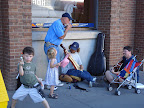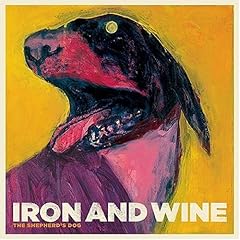Today I'll be finishing up our look at N.T. Wright's
The Last Word: Beyond the Bible Wars to a New Understanding of Scripture. In chapter eight, after having just discussed the interpretation problems that both conservatives and liberals demonstrate, Wright offers some suggestions on how to get back on track. He writes that the phrase 'the authority of Scripture' needs to be integrated to 'highlight the role of the Spirit as the powerful, transformative agent'; to 'keep as its central focus the goal of God's Kingdom'; 'envision the church as characterized by prayerful listening to, strenuous wrestling with, humble obedience before, and powerful proclamation of scripture'.
Major conclusion: "The shorthand phrase 'the authority of scripture' when unpacked offers a picture of God's sovereign and saving plan for the entire cosmos, dramatically inaugurated by Jesus himself, and now to be implemented through the Spirit-led life of the church
precisely as the scripture-reading community."
For Wright, this means that "'the authority of Scripture is most truly put into operation as the church goes to work in the world on behalf of the gospel, the good news that in Jesus Christ the living God has defeated the powers of evil and begun the work of new creation."
Wright proposes a 'multilayered view' of Scipture, which contains his five-act hermeneutic. He writes, "The Bible itself offers a model for its own reading, which involves knowing where we are within the overall drama and what is appropriate within each act. The acts are: creation, 'fall', Israel, Jesus, and the church; they constitute the differentiated stages in the divine drama which scripture itself offers."
Implications:
- "We are currently living in the fifth act, the time of the church...Those who live in this fifth act have an ambiguous relationship with the four previous acts, not because they are being disloyal to them but precisely because they are being loyal to them as part of the story."
- "Our relationship to the New Testament is not the same as our relationship to the Old, and we can say this with no diminution of our commitment to the Old Testament as a crucial and non-negotiable part of 'holy scripture'."
- "We who call ourselves Christians must be totally committed to telling the story of Jesus both as the climax of Israel's story and as the foundation of our own...It is an essential part of authentic Christian discipleship both to see the New Testament as the foundation for the ongoing (and still open-ended) fifth act and to recognize that it cannot be supplanted or supplemented."
- Improvisation: "All Christians, all churches, are free to improvise their own variations designed to take the music forward. No Christian, no church, is free to play out of tune. To change the metaphor back to the theater: all the actors, and all the traveling companies of which they are part are free to improvise their own fresh scenes. No actor, no company, is free to improvise scenes from another play, or one with a different ending. If only we could grasp that, we would be on the way to healthy and mutually respectful living under the authority of Scripture."
Wright concludes with five strategies for honoring the authority of Scripture - We do so by a reading of Scripture that is:
- Totally contextual - (the passages read in the context of the narrative, in the context of history, and appropriated into our context)
- Liturgically grounded - (the reading of Scripture plays a central role in our public gatherings)
- Privately studied - (individuals read Scripture to grow and change)
- Refreshed by appropriate scholarship - (giving freedom to scholars to explore new meanings of biblical texts while not blatantly disregarding the historical and cherished perspectives of the church)
- Taught by the church's accredited leaders - (the church ought to be led by Bible teachers, not by bureaucratic administrators)
For more by N.T. Wright, read THIS FANTASTIC ARTICLE which is a helpful perspective on how we read Scripture appropriately.





